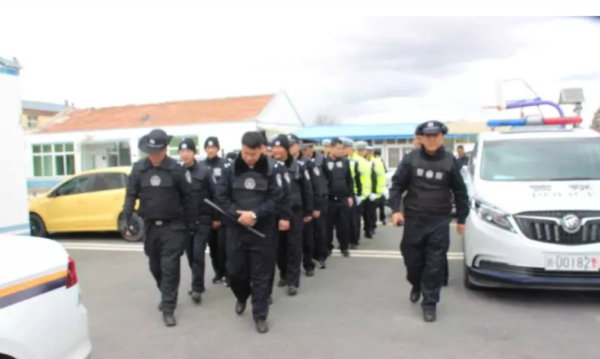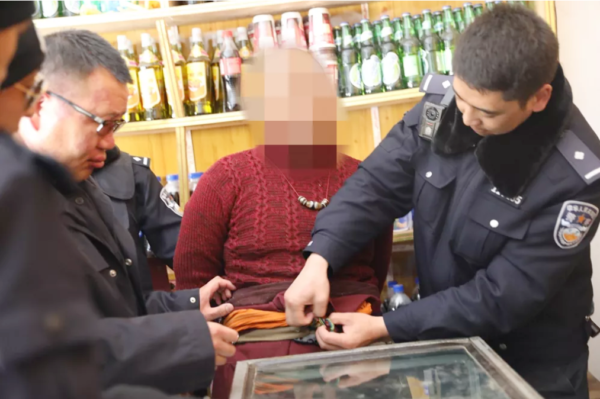
- A nationwide political campaign in China against “black” and “evil forces” has intensified in Chinese-occupied Tibet with a strong emphasis on cracking down on “separatism in the name of religion” and loyalty to the Dalai Lama. Hardline Communist Party officials have warned that overseas Tibetans influenced by the Dalai Lama are also key targets.
- Twenty-one Tibetans are known to have been sentenced to prison in May in connection with the campaign, including two heads of villages and a nomadic camp leader accused of founding an environmental protection organization. Images published by local authorities in Tibet showed a black-uniformed police squad arriving to arrest a Tibetan who is prominent in the community and had refused to be relocated.
The intensification of the crackdown in Tibet was announced by an inspection team to Lhasa in mid-June led by Zhu Weiqun, a Chinese official known for his harsh rhetoric against the Dalai Lama. Chinese state media said the crimes they were targeting “are usually related to separatist forces in the region” and quoted Zhu Weiqun as saying: “We strongly oppose and resolutely crack down on any separatist force in the name of ethnicity or religion, which are mainly organized by the Dalai clique.”[1]
Expressions of support for the Dalai Lama are regarded as an organized crime, according to a circular issued by police in the Tibet Autonomous Region (TAR) last year.[2]
In addition, last February a notice was issued in the TAR declaring a range of traditional or informal social activities among Tibetans to be illegal, including local initiatives for environmental protection, language preservation or community mediation.[3]
The language of the political campaign is aimed at intimidating Tibetans and ensuring draconian levels of control. State media also warned that visiting Tibetans were at risk, with Tibet University professor Xiong Kunxin quoted as saying: “As for Tibet, overseas secessionists may be the root of some gangs.”
Tibetans who have visited the area confirm the climate of fear and oppression in the TAR, with some describing it as “like a prison.” Visitors to Tibet have to inform the authorities if they are even planning a day away from the place where they are staying, and they are not allowed to carry cellphones, particularly at important religious sites such as temples and monasteries.
During the inspection team visit, leaders including Deputy Party Secretary of the TAR Lobsang Gyaltsen asserted that the three-year campaign against gang crime and “evil forces” across China is in line with Chinese Party Secretary and President Xi Jinping’s specific instructions “on the special struggle against evil.” Referencing the “special” situation in Tibet, which is at least partially an acknowledgement that the Party has not fully secured the allegiance of officials or the broader Tibetan public, particularly where loyalty to the Dalai Lama is concerned, Zhu Weiqun said: “We must combine the special situation of Tibet with the situation, and closely combine the fight against evil and the struggle against separatism.”[4]
The visit by Chinese officials this month coincided with the return to Lhasa of Gyaltsen Norbu, the Chinese-appointed Panchen Lama, one of the highest-ranking Tibetan Buddhist leaders. The Chinese government installed Gyaltsen Norbu as the Panchen Lama in 1995 after kidnapping the six-year-old boy whom the Dalai Lama had recognized for the role.[5] Gyaltsen Norbu was in Tibet to conduct unspecified “research” and “Buddhist activities.”[6] A new title was also announced for him as president of the TAR Branch of the Buddhist Association of China, indicating the Chinese government’s systematic efforts to increase Gyaltsen Norbu’s prominence after his first visit abroad to Thailand in mid-May. Chinese authorities were taken aback by evidence of the continued popularity of the previous Panchen Lama’s daughter, Rinzin Wangmo, when she visited Lhasa last year.[7] Beijing’s concerted promotion of Gyaltsen Norbu is part of an intensified and systematic political strategy to counter and undermine the Dalai Lama’s global influence and co-opt Tibetan Buddhist religion and culture.
The political struggle against the Dalai Lama’s popularity is central to Beijing’s concerns and is carried out on a war footing. Citing comments a Chinese professor allegedly made last year about a police circular, a state media article says: “The spread of separatist gangs in Tibet is rampant […] a campaign against the gangsters would deter off secessionist activities by the Dalai.”[8] In connection with the current crackdown, the state media reported that the head of Tibet’s High People’s Court said in January that 360 people in 268 cases were found guilty during the region’s crackdown on gang crimes in 2018, and that another 25 people were also punished for “inciting separatism or financial crimes which jeopardized national security.” No further information was provided about individual cases.[9]
Tibetans arrested in Kham and Amdo in connection with ‘evil forces’ campaign
According to information issued by the local government, last month the Nangchen (Chinese: Nangqian) County People’s Court sentenced 21 Tibetans in connection with the intensified drive in Tibet against gangs and “evil forces” in Yulshul (Chinese: Yushu) Tibetan Autonomous Prefecture, Qinghai Province (the Tibetan province of Kham).
In the police raids at multiple locations to arrest the 21 Tibetans, the Nangchen county government claimed that the “successful detection of this case benefited from the scientific decision-making and correct guidance of the main leaders of the State Political and Legal Committee and the State Public Security Bureau, and provided new ideas and directions for the investigation of similar cases involving evil and gambling gangs in Tibetan areas.”[10]
Of the 21 arrested, a group of 11 from Do Trang (Chinese: Duochang) village in Sharnda (Chinese: Xiangda) town in Nangchen county were sentenced in May to prison terms ranging from two to six years and monetary fines from 10,000 to 50,000 yuan. Among them was a former head of a village committee, charged with “creating hurdles for the government policy, not accepting environmental conservation compensation, and stopping others from receiving it, and negatively influencing the regular working of the village and party committees,” according to an online posting from county authorities.
The same source stated that another group of 10 Tibetans was sentenced to varying prison terms ranging from three-and-a-half to six years, including a former nomadic camp leader who was accused of founding an illegal organisation in the name of environmental protection.[11]
Meanwhile, photos released by Chinese authorities in Khyungchu county (Chinese: Hongyuan) in Sichuan’s Ngaba prefecture (Chinese: Aba), part of the Tibetan province of Amdo, depicted a black-uniformed police “task force” arriving to arrest a 47-year-old Tibetan named Dugkar, with one image showing him in his monk’s robe being handcuffed with his face blurred.
Dugkar, a businessman who is a former student at the Tibetan Buddhist institute of Larung Gar in Serthar (Chinese: Seda), Sichuan, was accused of “jeopardizing social order by gambling and casino activities,” but family sources link his arrest to earlier incidents when Dugkar fell afoul of the authorities, including his objections to being forcibly relocated.

In a detailed account of the arrests, the Tibetan Centre for Human Rights and Democracy reports: “In 2015, the Chinese government had announced an eco-tourism project to develop a holy lake located in Tsolung valley in Serdeu. The development of the lake as a tourist site led to widespread land seizures by local authorities. The highway project to Tsolung valley required the relocation [of] four nomadic households one of which was Dugkar’s. Some households relocated but Dugkar refused. Despite warnings from local authorities, Dugkar threatened to kill himself before leaving his land. Unable to rein in Dugkar, the authorities gave up and built the highway around his house.”[12]
Khyungchu county authorities published the names of nine of those arrested in the same official source cited by the Tibetan Centre for Human Rights and Democracy. Only the first syllable of each name was given, followed by the syllable “Ché” to partially anonymize the names.
- De Ché (Dugkar), male, 47, Serdeu (Chinese: Sedi) resident, suspected of opening a casino
- Tse Ché, male, 33, Serdeu resident, suspected of opening a casino
- Pe Ché, male, 38, Serdeu resident, suspected of opening a casino
- Tse Ché, male, 36, Serdeu resident, suspected of opening a casino
- Drub Ché, male, 25, Serdeu resident, suspected of involvement in gambling and illegal detention
- Ney Ché, male, 31, Serdeu resident, suspected of gambling and theft
- Gon Ché, male, 32, Serdeu resident, suspected of setting up a casino crime, concealing the crime of “concealing the proceeds of crime”
- Nyi Ché, male, 31, Serdeu resident, suspected of participation in gambling
- Tsul Ché, male, 36, Serdeu resident, suspected of participation in gambling
Footnotes:
[1] Global Times, June 18, 2019, http://www.globaltimes.cn/content/1154766.shtml
[2] The circular, issued in February 2018, urged the public to inform on people they suspect of being loyal to the Dalai Lama and his “evil forces” across Tibet. According to the Chinese state media, the circular was aimed at deterring the “gangsters” that “the Dalai group uses to spreading its message of separatism.” International Campaign for Tibet report, ‘Chinese police circular urges public to report on loyalty to ‘evil forces’ of Dalai Lama’, February 13, 2018, https://savetibet.org/chinese-police-circular-urges-public-to-report-on-loyalty-to-evil-forces-of-dalai-lama/
[3] https://www.hrw.org/report/2018/07/30/illegal-organizations/chinas-crackdown-tibetan-social-groups
[4] China Tibet news online in Chinese, June 18, 2019, http://epaper.chinatibetnews.com/xzrb/html/2019-06/18/content_895279.htm. The full statement on the “special” situation in Tibet is as follows: “It is necessary to improve the ideological understanding, accurately grasp the dialectical relationship between the universality and particularity of the contradictions in the special fight against evil and evil in our region, deepen the understanding of the characteristics of the special struggles in Tibet, closely combine the struggle against separatism and maintain stability, and insist on a black sweep.” This occurred at the meeting of the 13th Supervision Team of the Central Government and the Tibet Autonomous Region in Lhasa on June 17, 2019.
[5] Chinese authorities have referred to Gyaltsen Norbu as the Panchen Lama ever since their abduction of Gedhun Choekyi Nyima, a young child who was selected as the reincarnation of the 10th Panchen Lama in accordance with Tibetan Buddhist tradition by the Dalai Lama. The real Panchen Lama has not been seen in public since his abduction, which took place in 1995 when he was six years old.
[6] China Tibet Online in English, June 28, 2019, ‘11th Panchen Lama conducts research and Buddhist activities in Lhasa’, http://eng.tibet.cn/eng/index/top/201906/t20190628_6623271.html
[7] International Campaign for Tibet report, ‘China tightens screws on Tibetan Buddhism’, September 11, 2018, https://www.savetibet.eu/china-tightens-screws-on-tibetan-buddhism/
[8] Quote by a professor who researches religious studies at Public Security University of China, surnamed Dai, in Global Times, February 11, 2018, http://www.globaltimes.cn/content/1089209.shtml
[9] Global Times, June 18, 2019, http://www.globaltimes.cn/content/1154766.shtml
[10] Cited by Tibetan Centre for Human Rights and Democracy, ‘China: Stop the Witch Hunt in the campaign to crush black and evil crimes’, June 27, 2019, http://tchrd.org/china-stop-the-witchhunt-in-the-campaign-to-crush-black-and-evil-crimes-release-all-tibetans-unjustly-held-in-detention/. Link to the local authorities’ social media report in Chinese and Tibetan at: https://mp.weixin.qq.com/s?__biz=MzAwMTgzMTAwOA==&mid=2653339277&idx=1&sn=15d38939d6724ffc1b749e0e8f67f971
&chksm=8101a782b6762e94ad2e03fb7dbe5ff6f738e1a202c7d696b77f02db3fa3d1db7a5a759ee9ed&mpshare=1&scene=
1&srcid=0503sWPrsQZVSHao21Py5sdb&pass_ticket=qWqJTuXhFtNOCTmzne4qazRE%2Bv03saDI0InJuoWCQrvEdac
4715WHS3xm05Mivib#rd
[11] TCHRD source above, citing the Khyungchu county government.
[12] Tibetan Centre for Human Rights and Democracy report, ‘China: Stop the Witch Hunt in the campaign to crush black and evil crimes’, June 27, 2019, http://tchrd.org/china-stop-the-witchhunt-in-the-campaign-to-crush-black-and-evil-crimes-release-all-tibetans-unjustly-held-in-detention/